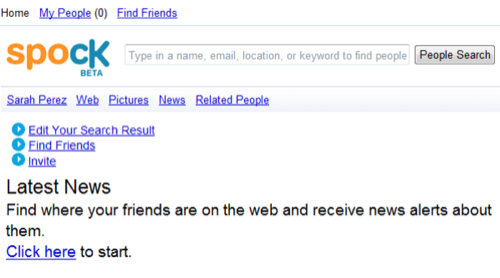Remember Spock? Over a year ago there was a lot of buzz around this vertical search engine for people, but now that excitement has worn off. Instead of searching for people on Spock or other similar people search engines, most users simply turn to old standbys like Facebook or LinkedIn. But don’t count Spock out just yet. Their new service, scheduled for launch in a couple of months, will transform them from a simple people search engine to a full-on public record search tool for only $1.99 per month.

According to MediaPost, in mid-January Spock plans to debut a new subscriber-only service that gives users access to data mined from public records found in government databases as well as info found on social network pages from sites like MySpace, LinkedIn, and Facebook. This new tool aims to complement other existing services they plan to offer, including the one launched earlier this year which scans Gmail accounts to help you find your friends.
Spock currently offers a public records search option to logged in users. In addition to the pictures, news, and web results Spock returns, public record data is pulled from USSearch.com. However, to get the details to those records, you still have to pay a one-time fee.

Privacy Concerns
Since its launch, many have people have raised concerns about how Spock operates. As noted earlier this year on Skiptease, there are several reasons to be wary of Spock, including the following:
1. Spock allows anyone to create and edit your personal information on the site, which raises numerous privacy concerns as well as concerns about the reasons people may have for editing your information on the site.
2. Editing or deleting information added about you does not guarantee that the changes will be made on Spock.com.
3. If you aren’t informed that a profile or personal information has been added about you on the site, you might not discover the information until it shows up in a search engine query.
4. Even when your Spock profile is claimed by you, you still have little control over the information published on it. You can’t personally get rid of any information and you have to request that the page be removed by the Spock search.
5. Turning a people search and social networking site like Spock.com into a wiki format where anyone can add and edit a profile on you allows people with a malicious intent to hijack your online identity and reputation.
6. The Spock people search allows users to flag inaccurate information. However, if you don’t know that you are in their search database, there is no way to handle the information that has been published about you on the site.
On SEOMoz, after experiencing issues editing her own info, Jane Copland asked if a search engine that allows strangers to edit personal information about other people and then doesn’t offer those people a quick way to remove the information they don’t appreciate was “just a part of the internet we have to get used to” or if Spock goes a bit too far.
We found editing our profile information on Spock easy, though…that is, until an error message appeared which prevented us from continuing with the deletions we made. Afterward, we returned to our profile only to find that everything we had previously removed was still present.

With the upcoming public record subscription service, Spock has the potential to become even more of a privacy concern than before. By tying together your photos, web search results, social network profile info, and public record information, which invariably contains things like age and address history, we can see where Spock starts to cross the line from becoming simply a useful tool to one that starts to creep us out a little.
Do you agree? Let us know in the comments.
Note: we tried to contact Spock for more information on the service, but emails sent to the company bounced. Yikes.

















